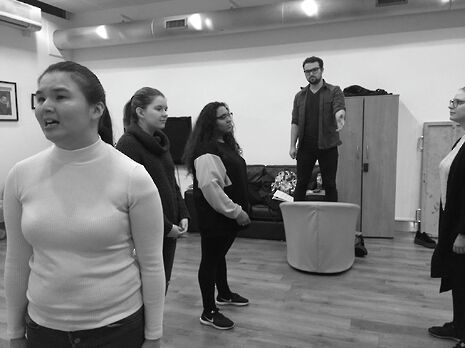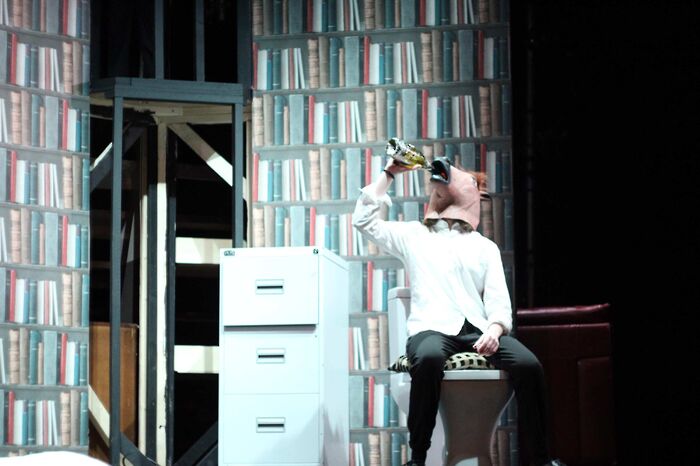Violet preview
Katy Bennett discusses bringing to life this musical story of determination, faith and love in the face of adversity with director Charlotte Husnjak

Violet has been “chronically underdone”, director Charlotte Husnjak tells me, “which is a real pity because it’s fantastic.” Husnjak first discovered the musical when she was 13, so has a particularly personal connection to the script, and her enthusiasm for the story is apparent as soon as we begin talking.
Set against the backdrop of the American South in the 1960s, Brian Crawley’s musical based on the short story “The Ugliest Pilgrim”, follows Violet Karl (Jasmine Thien) as she leaves home and embarks on a long bus journey in search of healing, in the shadow of a traumatic childhood injury that has defined her ever since. The musical was first staged in 1997 and explores themes of diversity, self-acceptance, faith and love, accompanied by Jeanine Tesori’s heartfelt score.
“[Violet’s] determination is at the heart of this”, Husnjak tells me. As the story follows her across America, we see Violet’s inner journey towards self-acceptance, as she struggles to come to terms with her injury, her fraught relationship with her father (Alex Evans), and her belief that she is unlovable. At one point, Young Violet (Louisa Stuart-Smith) entreats her father, “would you have loved [my mother] if she looked like me?”
Husnjak sees the father-daughter relationship in particular as something not often explored in theatre, and rarely from the perspective of the daughter. The musical also explores the complex love story between Violet, Flick (Adhvik Shetty) and Monty (Brandon Lino), but “never in a way that is central to her personal progress”, says Shetty. Ultimately, through the relationships between all of the musical’s characters, I am told that the story always comes back to “learning to love yourself”.
Another central theme of the musical is diversity, which is something the production team had in mind from the outset, holding drop-in sessions targeted at self-identifying disabled and BME actors, for whom specific roles were set aside. “We wanted the performances to be very truthful,” assistant director Jonathan Iceton and producer Rebecca Mayer explain. Jasmine Thien, who plays the eponymous role of Violet, adds that she relates strongly to Violet because of her experience of being treated differently because of her own disability (Thien is blind), although she has tried not to let this “dictate” how she portrays Violet, seeking a balance between Husnjak’s vision and the unique perspective on the character given to her by her personal experiences.
Disabled representation in Cambridge Theatre is undoubtedly lacking, and Husnjak points out that Violet is normally played by an able-bodied woman, despite a major theme of the play centring on her struggles to come to terms with the aftermath of a massive injury and how she is perceived by the outside world because of it. Thien tells me that from her experience, the portrayal of disabilities often falls into the category of either “inspiration porn” or “suffering porn”, where disabled characters are not allowed to be fully-rounded people. She adds that “I don’t see her disability as the sole part of Violet”, highlighting the nuanced aspects of her character.
Husnjak also discusses some of the issues she had in bringing the script to life for a Cambridge audience, noting that at points the themes of racism and ableism are handled in ways that could be perceived as problematic, particularly in the musical’s choices of language. She made the decision to rework the script in some places and has also added her own twist on the ending, explaining that she wanted it to reflect an updated world view.
"It is clear how much effort everyone has put into their respective roles, and the cast is evidently tight-knit"
The musical aspect of Violet is an important part of the play, with much of the action sung through. Husnjak summarises Tesori’s score as “the sound of the South”, adding that the music is “evocative of everything of that time” – from blues, to country, to gospel.
For someone who has loved this play for almost a decade, Husnjak tells me that working on the script with the actors has “revived it in a way I didn’t think was possible”. From the rehearsals alone, it is clear how much effort everyone has put into their respective roles, and the cast is evidently tight-knit, with the rehearsal room feeling energetic and lively.
At the heart of Violet is its characters, and at the centre of this is Violet herself, whose resilience and bravery takes her on a journey which ends up being about “so much more than the distance she travels”, in Husnjak’s words. Violet promises to be a moving, heartfelt and uplifting story about self-acceptance and belonging, which seeks to celebrate and empower the complexities of human existence, and will undoubtedly leave its mark on the audience.
 News / Eight Cambridge researchers awarded €17m in ERC research grants27 December 2025
News / Eight Cambridge researchers awarded €17m in ERC research grants27 December 2025 News / Downing investigates ‘mysterious’ underground burial vault 29 December 2025
News / Downing investigates ‘mysterious’ underground burial vault 29 December 2025 Lifestyle / Ask Auntie Alice29 December 2025
Lifestyle / Ask Auntie Alice29 December 2025 Sport / Hard work, heartbreak and hope: international gymnast Maddie Marshall’s journey 29 December 2025
Sport / Hard work, heartbreak and hope: international gymnast Maddie Marshall’s journey 29 December 2025 News / News in Brief: carols, card games, and canine calamities28 December 2025
News / News in Brief: carols, card games, and canine calamities28 December 2025








